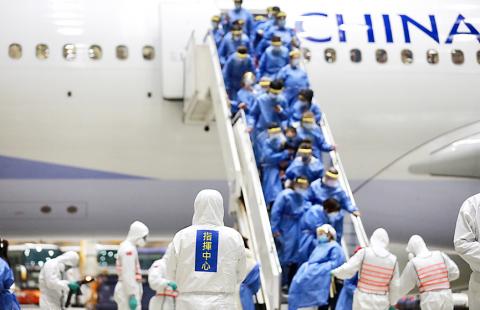Two charter flights from Wuhan, China, arrived in Taiwan at nearly midnight and early yesterday morning carrying 361 Taiwanese, who were placed in three quarantine centers after being screened for fever and respiratory symptoms, the Central Epidemic Command Center (CECC) said.
Minister of Health and Welfare Chen Shih-chung (陳時中), who heads the center, said that the two flights, operated by China Airlines and China Eastern Airlines, landed in Taiwan at about 11:40pm on Tuesday and at about 4am yesterday morning respectively after delayed departures.
“There were many negotiations between Taiwan and China, but we found that there are still many differences in perception and approach on how the operation should proceed,” Chen said, but added that “both sides were willing to accomplish the mission and overcame some difficulties to make it happen.”

Photo: CNA
The China Airlines flight carried 169 passengers, 10 medical personnel and 12 crew members from Taiwan, while the China Eastern Airlines aircraft carried 192 passengers and three medical personnel from Taiwan, he said.
A total of 22 buses and 10 ambulances were deployed at Taiwan Taoyuan International Airport to ferry the 361 passengers to the quarantine centers for 14-day quarantine or to hospitals if they exhibited symptoms, he added.
The differences between the two sides included Chinese authorities claiming that the passengers did not need to don protective equipment because they had all tested negative for COVID-19 and screened for a fever before boarding, but the Taiwanese government insisted that they should still wear a mask, goggles and protective clothing, Chen said.
“We want to avoid the chances of regretting that we did not do enough, so we would rather take thorough preventive measures when we can,” Chen said.
Some confirmed cases in Taiwan have shown that a person can go from testing negative to positive, so it is better to be careful, he said.
A few people who were on the passenger list did not report to the airport in Wuhan and a few who refused to be screened for symptoms were not allowed to board the aircraft, including a man who had a mild fever, Chen said, adding that the CECC is concerned whether he would receive proper medical treatment in China.
While the CECC did not know why some passengers refused to be screened or did not show up at the airport, Chen said that some might have had mild symptoms and were afraid that they would be forcibly hospitalized in China, increasing their risk of contracting COVID-19.
Following Taipei’s request that vulnerable people receive priority and that proper disease-prevention measures be taken for the flights, Ministry of Health and Welfare Department of Medical Affairs Director-General Shih Chung-liang (石崇良) said that about 20 percent of the passengers were minors, while the oldest was 91 years old.
The passengers who might need medical attention were taken to the quarantine center closest to a hospital, Shih said.
Many quarantine officials, medical personnel and other officials stayed up all night to accomplish the mission, said Chen, who oversaw the operations at the airport and visited all three quarantine centers before holding a news conference at the CECC in Taipei in the morning.
“I am not the only one who is exhausted. Everyone is equally tired, but they are willing to do more for Taiwanese,” he said.

DEFENSE: The National Security Bureau promised to expand communication and intelligence cooperation with global partners and enhance its strategic analytical skills China has not only increased military exercises and “gray zone” tactics against Taiwan this year, but also continues to recruit military personnel for espionage, the National Security Bureau (NSB) said yesterday in a report to the Legislative Yuan. The bureau submitted the report ahead of NSB Director-General Tsai Ming-yen’s (蔡明彥) appearance before the Foreign and National Defense Committee today. Last year, the Chinese People’s Liberation Army (PLA) conducted “Joint Sword-2024A and B” military exercises targeting Taiwan and carried out 40 combat readiness patrols, the bureau said. In addition, Chinese military aircraft entered Taiwan’s airspace 3,070 times last year, up about

A magnitude 4.3 earthquake struck eastern Taiwan's Hualien County at 8:31am today, according to the Central Weather Administration (CWA). The epicenter of the temblor was located in Hualien County, about 70.3 kilometers south southwest of Hualien County Hall, at a depth of 23.2km, according to the administration. There were no immediate reports of damage resulting from the quake. The earthquake's intensity, which gauges the actual effect of a temblor, was highest in Taitung County, where it measured 3 on Taiwan's 7-tier intensity scale. The quake also measured an intensity of 2 in Hualien and Nantou counties, the CWA said.

The Overseas Community Affairs Council (OCAC) yesterday announced a fundraising campaign to support survivors of the magnitude 7.7 earthquake that struck Myanmar on March 28, with two prayer events scheduled in Taipei and Taichung later this week. “While initial rescue operations have concluded [in Myanmar], many survivors are now facing increasingly difficult living conditions,” OCAC Minister Hsu Chia-ching (徐佳青) told a news conference in Taipei. The fundraising campaign, which runs through May 31, is focused on supporting the reconstruction of damaged overseas compatriot schools, assisting students from Myanmar in Taiwan, and providing essential items, such as drinking water, food and medical supplies,

New Party Deputy Secretary-General You Chih-pin (游智彬) this morning went to the National Immigration Agency (NIA) to “turn himself in” after being notified that he had failed to provide proof of having renounced his Chinese household registration. He was one of more than 10,000 naturalized Taiwanese citizens from China who were informed by the NIA that their Taiwanese citizenship might be revoked if they fail to provide the proof in three months, people familiar with the matter said. You said he has proof that he had renounced his Chinese household registration and demanded the NIA provide proof that he still had Chinese